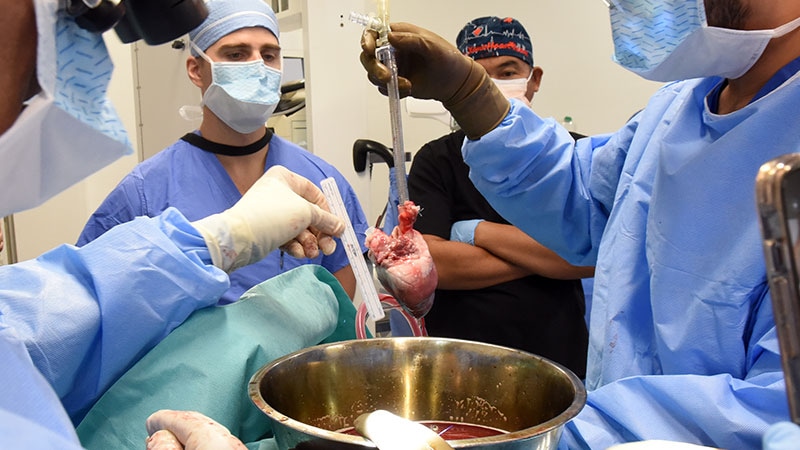Second Patient with Genetically Modified Pig-Heart Transplant at UM Progressing Well
Belangrijkste concepten
Successful progress of second pig-heart transplant recipient at UM.
Samenvatting
Introduction
Second patient with genetically modified pig-heart transplant at UMMC.
Stable condition post-operation on September 22.
Avoided hyperacute rejection.
Patient Comparison
Patient, Lawrence Faucette, benefiting from lessons learned from David Bennett's case.
Bennett faced complications post-transplant, including infections and immunosuppressant regimen adjustments.
Viral Infection
Bennett's heart carried porcine cytomegalovirus, but no evidence of infection in other organs.
Faucette's experience documented in various reports and articles.
Patient Condition
Faucette previously turned down by multiple transplant hospitals due to pre-existing conditions.
Currently breathing independently with a well-functioning heart.
Medical Team's Hope
Dr. Mohiuddin optimistic about Faucette's progress.
Faucette receiving experimental antibody tegoprubart as part of immunosuppressant regimen.
Future Prospects
Eledon Pharmaceuticals studying efficacy of anti-CD40-ligand blocker in kidney transplant patients.
Hopeful for Faucette's discharge, but early to confirm.
Second Pig-Heart Transplant Patient at UM Faring Well
Statistieken
The patient, Lawrence Faucette, is a 58-year-old former lab tech.
David Bennett survived for 2 months post-transplant in January 2022.
Faucette is benefitting from the experience documented in various reports.
Citaten
"We're taking one day at a time. His immune system is still intact, despite the heavy immune suppression." - Muhammad M. Mohiuddin
"His heart didn't carry a virus and has not shown any signs of rejection so far." - Muhammad M. Mohiuddin
Belangrijkste Inzichten Gedestilleerd Uit
by Steve Stiles om www.medscape.com 09-25-2023
https://www.medscape.com/viewarticle/996799
Diepere vragen
How might the success of xenotransplantation impact the future of organ transplants?
The success of xenotransplantation, particularly in the case of genetically modified pig-heart transplants, could revolutionize the field of organ transplants. By utilizing organs from genetically modified pigs, which are in greater supply and can be engineered to reduce the risk of rejection, the shortage of human organs for transplantation could be alleviated. This could potentially reduce wait times for patients in need of organ transplants and increase overall success rates. Additionally, advancements in xenotransplantation could pave the way for the transplantation of other organs from animals to humans, opening up new possibilities for treating a wide range of medical conditions.
What ethical considerations arise from genetically modified pig-heart transplants in humans?
Genetically modified pig-heart transplants in humans raise several ethical considerations that need to be carefully addressed. One of the primary concerns is the potential for the transmission of zoonotic diseases from pigs to humans, which could pose significant health risks. Additionally, there are questions surrounding the welfare of the genetically modified pigs used for organ donation and whether their genetic modification raises ethical concerns about animal welfare and manipulation. Furthermore, issues related to informed consent, equity in access to this technology, and the long-term implications of introducing animal organs into the human body also need to be taken into account.
How can advancements in immunosuppressant regimens benefit other fields of medicine?
Advancements in immunosuppressant regimens, such as the development of novel drugs like tegoprubart that target specific immune pathways, can have far-reaching implications beyond organ transplantation. These advancements can be applied to other fields of medicine, such as autoimmune diseases, where modulating the immune response is crucial. By understanding how to selectively suppress the immune system without compromising its overall function, researchers can potentially develop new treatments for conditions like rheumatoid arthritis, lupus, and inflammatory bowel disease. Additionally, the knowledge gained from optimizing immunosuppressant regimens in the context of xenotransplantation can inform research in cancer immunotherapy and infectious diseases, leading to more effective and targeted therapies.
0
